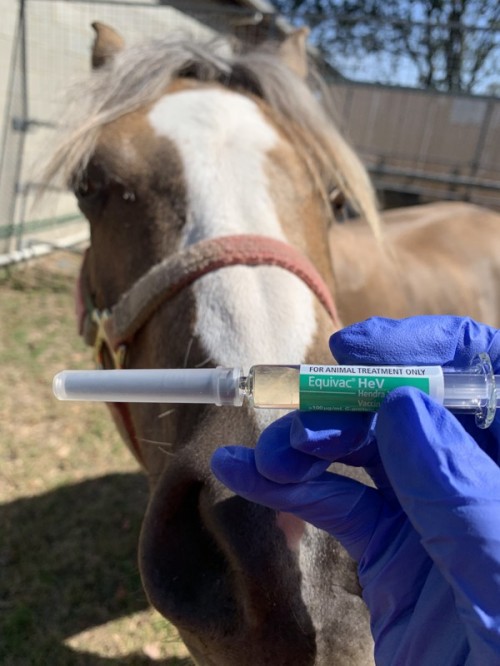

With the vaccine now in its 7th year of use, the hype about how horrible and dangerous the vaccine is seems to have settled down. There is a class action court case ongoing, but those who wanted to sue the manufacturers seem to be dropping off, in the knowledge that their case is flawed on so many levels.
At EVDS we vaccinate several hundred horses per year, and have encountered very few problems and certainly nothing that is life threatening or performance damaging etc. And in our vast network of fellow equine vets, we have heard zero reports of vets who are afraid of vaccinating their own horses with the vaccine, or putting their valued client’s horses in danger through using a vaccine that could possibly be dangerous on them. The most common reaction is a painful swelling at the injection site for a few days, or a horse dull and depressed for a few days. These reactions are at a similar level to what we see with strangles/tetanus vaccines which have been around for decades. For this reason, we do not recommend vaccinating within a week of competition. Should your horse get a vaccine reaction, we encourage owners to call us, as anti-inflammatories are usually of use in alleviating the symptoms.
Hendra Vaccine is SAFE
The vaccine is very safe, and it is proving to be highly effective in preventing hendra virus infection in horses. Hendra Virus kills horses and people and is spread to horses via flying foxes urine, faeces and saliva, especially when they are stressed. For this reason, it is important to not feed or water your horses under trees where flying foxes may feed or roost.
Vets unfortunately need to include the possibility of Hendra Virus infection in virtually any sick horse, largely due to the wide possibility of clinical symptoms they can present with - from just being off their feed, to a snotty nose, to a fever, to wobbling around, and also colic or choke. Sadly that means Hendra remains on the list of possibilities until it has been excluded through lab tests, performed in Sydney. So from the time a vet examines the horse and collects blood, it is often 2-3 days before the exclusion test to rule out Hendra is completed. It is only then, that the vet can start to treat the horse aggressively with the use of stomach tubes , IV injections etc if necessary. It is also only then that the owners would be allowed close contact with their sick horse. These fews days waiting for an exclusion test can be very stressful for all involved - especially the horse who is being denied proper treatment.
Vaccinating your horse also protects you
Other benefits of having your horse vaccinated relate to the State Work Place Health and Safety Laws, which we all have to abide by, whether we like it or not - especially in business where people are employed. Three Veterinarians have been prosecuted by WorkPlace Health and Safety in Qld as a result of treating sick and unvaccinated horses. With these precedents, there is now much apprehension amongst vets to want to become involved with a sick unvaccinated horse. There is a lot more risk, responsibility, paper work, time, personal protective equipment, legal responsibilities etc required for a vet to examine and treat sick unvaccinated horse compared to sick vaccinated horses. These costs to the vet practice need to be recouped, and the owner is often unhappy about these increased costs, so this is another reason vets would usually prefer to not have to examine sick unvaccinated horses.
Legal obstacles also include the Biosecurity Act of 2015, which is a law that basically states that all citizens carry a duty to prevent, eliminate or minimise risk to others who may contact their animal as far as reasonably practicable. So this Act has potential implications for horse owners in a positive hendra infection.
Safety is the best policy
We all have choices with our horses, but whatever you choose, vaccinate or not vaccinate, you need a plan of what to do when your horse becomes ill. Very few horses go through life without getting an illness of some type. Don't assume anything. Don't get cranky with your vet if they also choose to not want to become involved in the stress and extra work/risk involved in dealing with a sick and unvaccinated horse. Have the conversation with your vet before the need arises, rather than when it arises. You may know a person with a gun who can humanely shoot your horse to put it out of it's misery, rather than let it suffer due to lack of adequate planning etc.
Make sure that you wear adequate personal protection equipment - mask, gloves, glasses when dealing with sick horses. There are many other nasty bacteria and viruses other than hendra that you can contract from a sick horse, so please be careful, and protect your family and other horses from potential spread.
And it is also important to not forget the other important vaccines - especially tetanus and maybe strangles. Other diseases that can be vaccinated against in horses include Herpes Virus and Salmonella.

